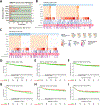Validated biomarker assays confirm that ARID1A loss is confounded with MMR deficiency, CD8+ TIL infiltration, and provides no independent prognostic value in endometriosis-associated ovarian carcinomas
- PMID: 34897700
- PMCID: PMC9544180
- DOI: 10.1002/path.5849
Validated biomarker assays confirm that ARID1A loss is confounded with MMR deficiency, CD8+ TIL infiltration, and provides no independent prognostic value in endometriosis-associated ovarian carcinomas
Abstract
ARID1A (BAF250a) is a component of the SWI/SNF chromatin modifying complex, plays an important tumour suppressor role, and is considered prognostic in several malignancies. However, in ovarian carcinomas there are contradictory reports on its relationship to outcome, immune response, and correlation with clinicopathological features. We assembled a series of 1623 endometriosis-associated ovarian carcinomas, including 1078 endometrioid (ENOC) and 545 clear cell (CCOC) ovarian carcinomas, through combining resources of the Ovarian Tumor Tissue Analysis (OTTA) Consortium, the Canadian Ovarian Unified Experimental Resource (COEUR), local, and collaborative networks. Validated immunohistochemical surrogate assays for ARID1A mutations were applied to all samples. We investigated associations between ARID1A loss/mutation, clinical features, outcome, CD8+ tumour-infiltrating lymphocytes (CD8+ TILs), and DNA mismatch repair deficiency (MMRd). ARID1A loss was observed in 42% of CCOCs and 25% of ENOCs. We found no associations between ARID1A loss and outcomes, stage, age, or CD8+ TIL status in CCOC. Similarly, we found no association with outcome or stage in endometrioid cases. In ENOC, ARID1A loss was more prevalent in younger patients (p = 0.012) and was associated with MMRd (p < 0.001) and the presence of CD8+ TILs (p = 0.008). Consistent with MMRd being causative of ARID1A mutations, in a subset of ENOCs we also observed an association with ARID1A loss-of-function mutation as a result of small indels (p = 0.035, versus single nucleotide variants). In ENOC, the association with ARID1A loss, CD8+ TILs, and age appears confounded by MMRd status. Although this observation does not explicitly rule out a role for ARID1A influence on CD8+ TIL infiltration in ENOC, given current knowledge regarding MMRd, it seems more likely that effects are dominated by the hypermutation phenotype. This large dataset with consistently applied biomarker assessment now provides a benchmark for the prevalence of ARID1A loss-of-function mutations in endometriosis-associated ovarian cancers and brings clarity to the prognostic significance. © 2021 The Pathological Society of Great Britain and Ireland.
Keywords: ARID1A; CD8; DNA mismatch repair; clear cell ovarian carcinoma; endometrioid ovarian carcinoma; endometriosis-associated ovarian carcinoma; immunohistochemistry; prognosis.
© 2021 The Pathological Society of Great Britain and Ireland.
Figures


Comment in
-
Definitive study shows no association between ARID1A mutation status and clinical outcome in endometriosis-related ovarian cancers‡.J Pathol. 2022 Sep;258(1):1-3. doi: 10.1002/path.5973. Epub 2022 Jun 29. J Pathol. 2022. PMID: 35647895 Free PMC article.
References
-
- Reisman D, Glaros S, Thompson EA. The SWI/SNF complex and cancer. Oncogene 2009; 28: 1653–1668. - PubMed
-
- Nagl NG Jr., Patsialou A, Haines DS, et al. The p270 (ARID1A/SMARCF1) subunit of mammalian SWI/SNF-related complexes is essential for normal cell cycle arrest. Cancer Res 2005; 65: 9236–9244. - PubMed
Publication types
MeSH terms
Substances
Supplementary concepts
Grants and funding
- R01 CA087538/CA/NCI NIH HHS/United States
- R01 CA058598/CA/NCI NIH HHS/United States
- K07 CA080668/CA/NCI NIH HHS/United States
- 15601/CRUK_/Cancer Research UK/United Kingdom
- R01 CA248288/CA/NCI NIH HHS/United States
- 22905/CRUK_/Cancer Research UK/United Kingdom
- N01 CN025403/CA/NCI NIH HHS/United States
- R01 CA126841/CA/NCI NIH HHS/United States
- M01 RR000056/RR/NCRR NIH HHS/United States
- R01 CA095023/CA/NCI NIH HHS/United States
- R01 CA168758/CA/NCI NIH HHS/United States
- P30 CA071789/CA/NCI NIH HHS/United States
- R01 CA112523/CA/NCI NIH HHS/United States
LinkOut - more resources
Full Text Sources
Medical
Research Materials

